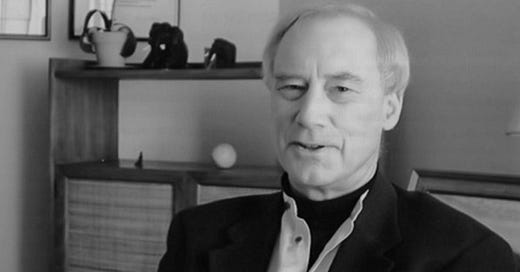Ever feel like you’re simultaneously unraveling and getting your act together? Like you're trying to let go and hold it all together at the same time?
Yeah. Me too.
This week’s post sits in that paradox—with a monk, a therapist, and a poem that’s followed me for years. It’s about being somebody, becoming nobody, and why I endeavor to start every day from scratch.
👉 If you’re new to From Scratch, welcome. You can check out the post Begin Here for an overview of what this space is about—plus a few complimentary practices to get you started.
A newly ordained monk went to the abbot with a question that had been weighing heavily on his heart. After entering the abbot’s interview chamber, he bowed three times and said:
—Master, I need help understanding something.
—Whatever is the matter, young monk?
—Well… it’s this… what I see as my problem is that the monastic code seems to be all about holding on—holding to the precepts, all 227 of them, as the Buddha prescribed for “right action.” But the Dharma itself seems to be about letting go. Letting go of identity, of opinions, of attachments. And I can’t reconcile the two.
—You’re absolutely right, young one. The monastic life is about holding on—to the container of wise action. The Dharma path is about letting go—of all clinging, especially to who you think you are. When you learn to hold the tension between those two truths, you'll be doing quite well. I can’t tell you how to do that—but I encourage you to keep practicing, and to hold this question in your heart. When the insight of grace arrives, clarity will settle as simply and as unmistakably as the robin’s song outside our window just now.
And with that, the master rang the bell. The interview was over.
—
My late therapist, Jack Engler, put this same tension into different terms. He famously said:
“You have to be somebody before you can become nobody.”
Jack worked to integrate Western psychology and Buddhist contemplative practice. He used to believe these were developmental stages: first, build a solid self; then, with Dharma, dismantle it. But later in life, he revised that view. He came to see being somebody and becoming nobody as parallel processes—symbiotic, mutually reinforcing.
A healthy ego, he’d say, is precisely what allows us to see through the ego’s illusions. And those who’ve truly tasted emptiness often return with more humility and care for the work of character. The more stable the self, the more safely it can dissolve. The more dissolved the self, the more lovingly it can be rebuilt.
I often brought this tension into my own sessions with Jack—between being a jittery somebody and an anxious would-be nobody. Coffee in hand, I’d confess that meditation didn’t seem to be helping. If anything, it unearthed more layers of neurotic static than it soothed.
Jack would nod, unhurried, and tell stories. One of his favorites: A student once asked Zen teacher Philip Kapleau whether satori made personal problems go away. Kapleau replied that with awakening you finally have the light to face them properly.
Earlier this week, I tried to write a poem about these themes—about change, identity, and loss. But I realized I wasn’t writing something new. I was transcribing a poem I’d absorbed years ago, one that lives somewhere in my bloodstream.
The Layers
by Stanley KunitzI have walked through many lives,
some of them my own,
and I am not who I was,
though some principle of being
abides, from which I struggle
not to stray.
When I look behind,
as I am compelled to look
before I can gather strength
to proceed on my journey,
I see the milestones dwindling
toward the horizon
and the slow fires trailing
from the abandoned camp-sites,
over which scavenger angels
wheel on heavy wings.
Oh, I have made myself a tribe
out of my true affections,
and my tribe is scattered!
How shall the heart be reconciled
to its feast of losses?
In a rising wind
the manic dust of my friends,
those who fell along the way,
bitterly stings my face.
Yet I turn, I turn,
exulting somewhat,
with my will intact to go
wherever I need to go,
and every stone on the road
precious to me.
In my darkest night,
when the moon was covered
and I roamed through wreckage,
a nimbus-clouded voice
directed me:
“Live in the layers,
not on the litter.”
Though I lack the art
to decipher it,
no doubt the next chapter
in my book of transformations
is already written.
I am not done with my changes.
For today, I’ll live in the layers. And all their unanswerable questions.
Thanks for walking this road—layered, uneven, strangely precious—with me.
Josh
P.S.
This week’s Meditation Experiment and Yin Practice Lab will both explore ways to inhabit the paradox of being somebody and becoming nobody. I hope you’ll join me.







Living in the layers too….. saw this quote from a favorite essayist that seems to be weaving from similar threads. Perhaps you’ll agree. 🙏🏻
“There should be a word for this: the ache of catching up to your own becoming.
I think of a tree that has lost a branch in a storm. The wound does not seal overnight. The tree doesn’t pretend the limb was never there. Instead, over time, it grows around the loss. It integrates it. The scar becomes part of the shape of the tree, visible but no longer raw. Perhaps this is what integration looks like: not erasure, but incorporation.”
~Isabel Abbot